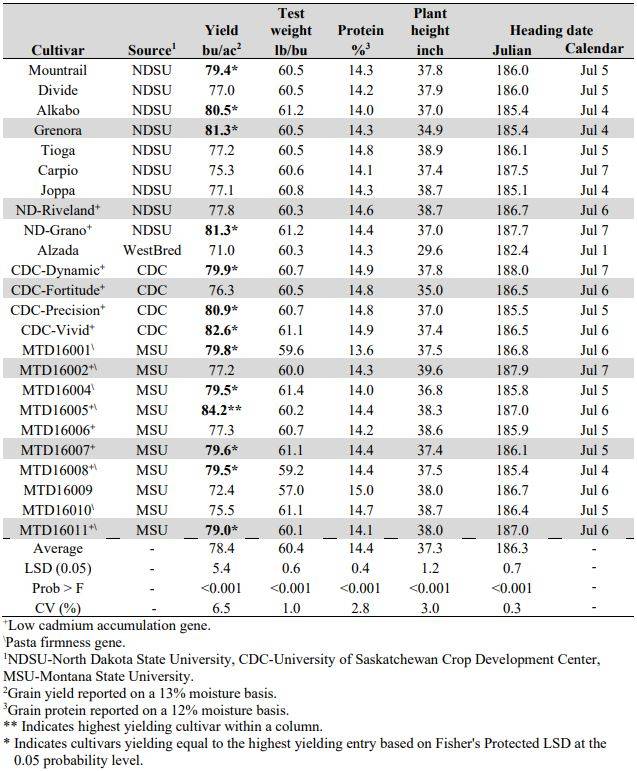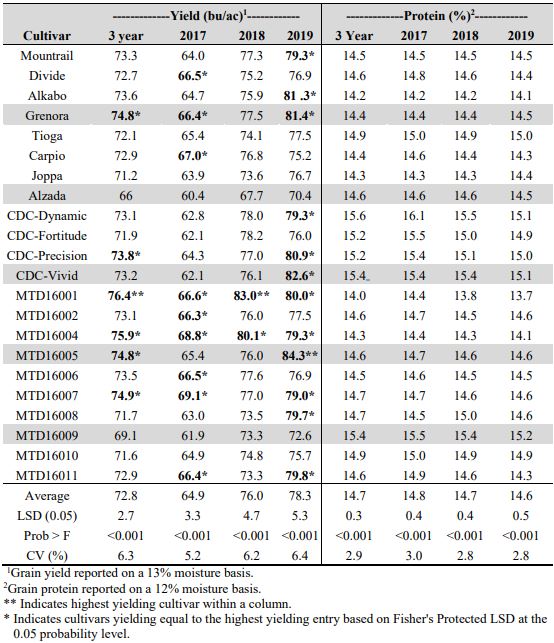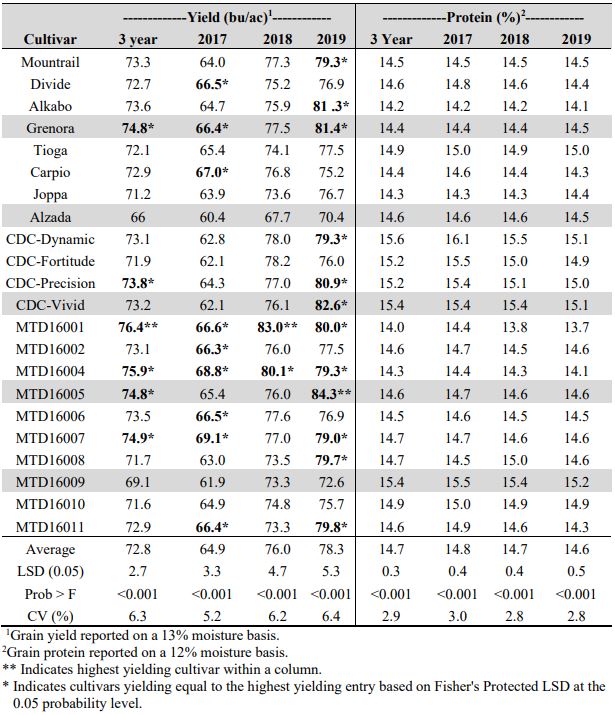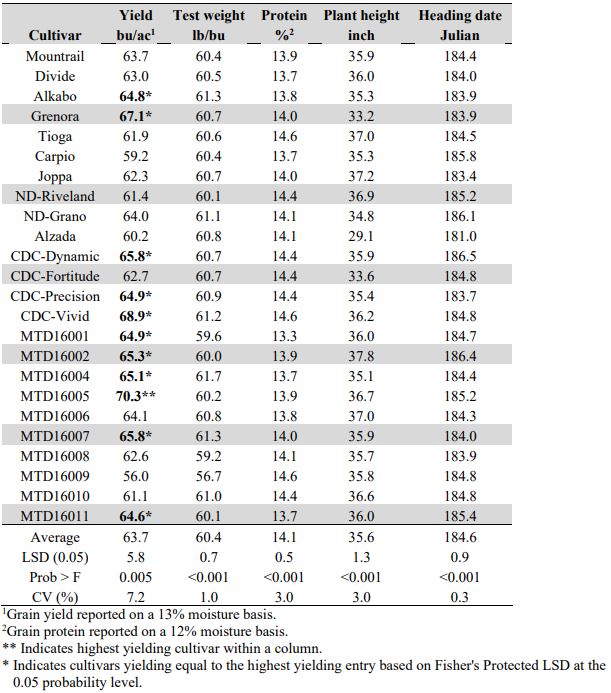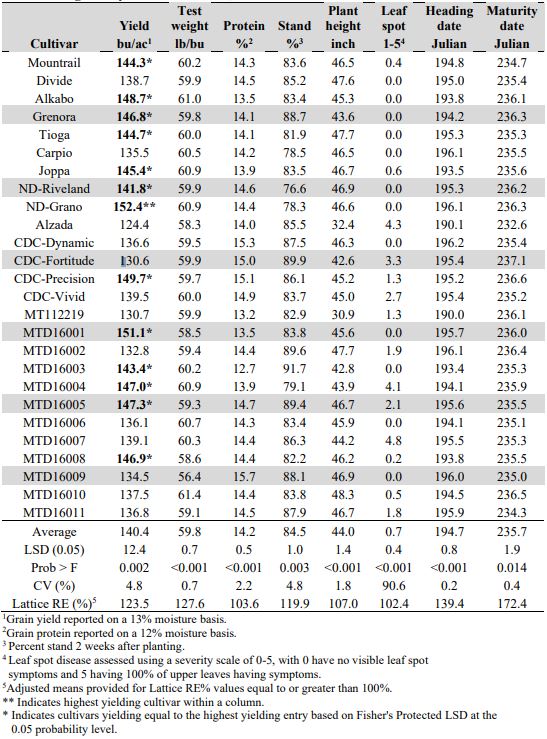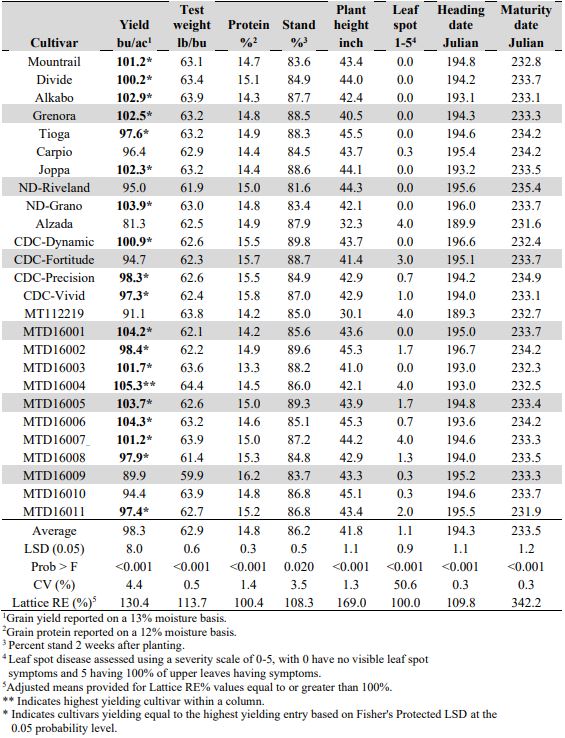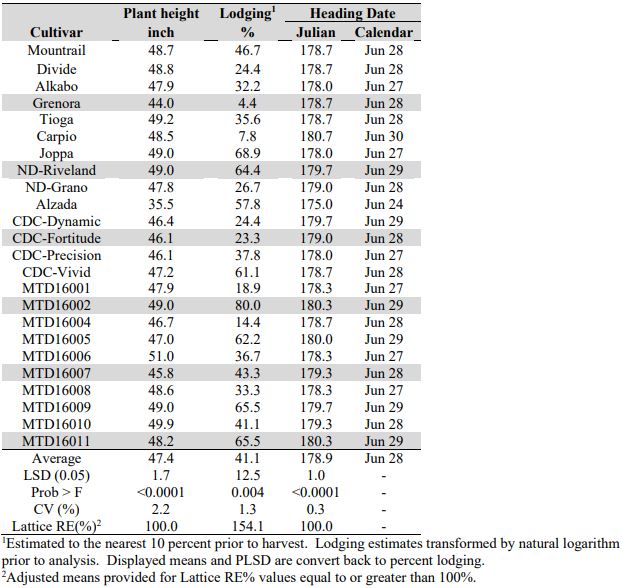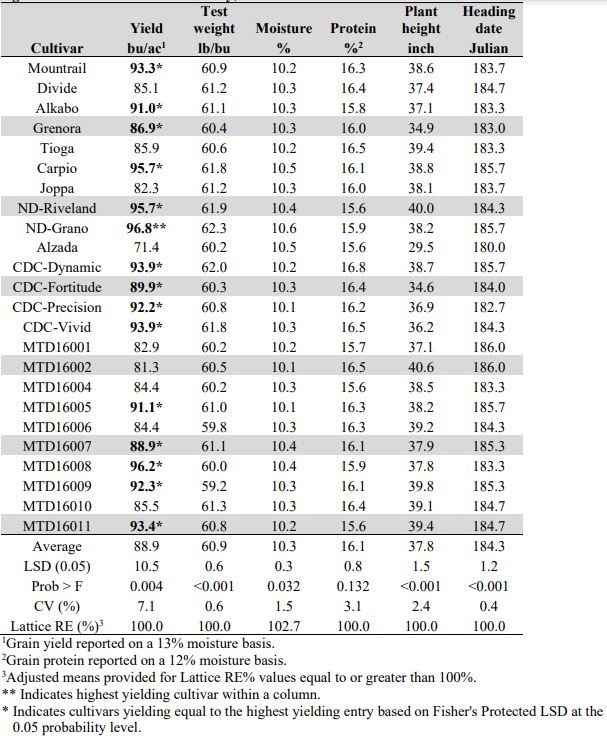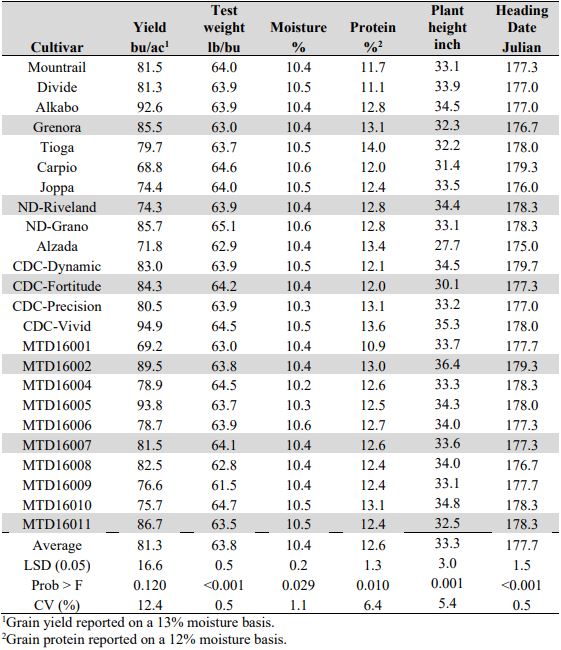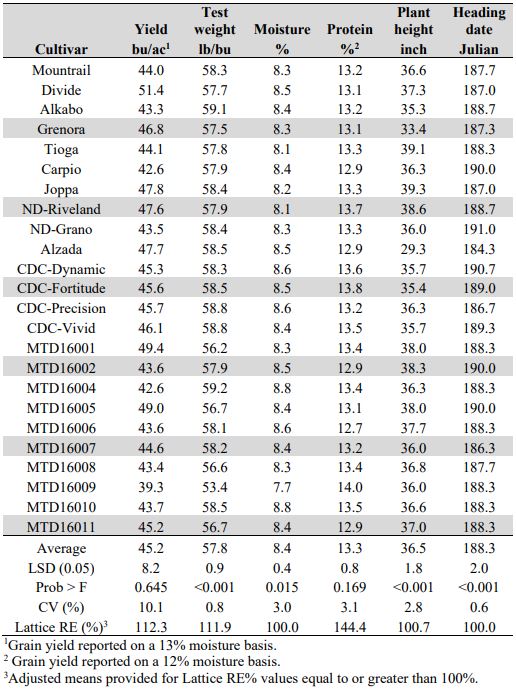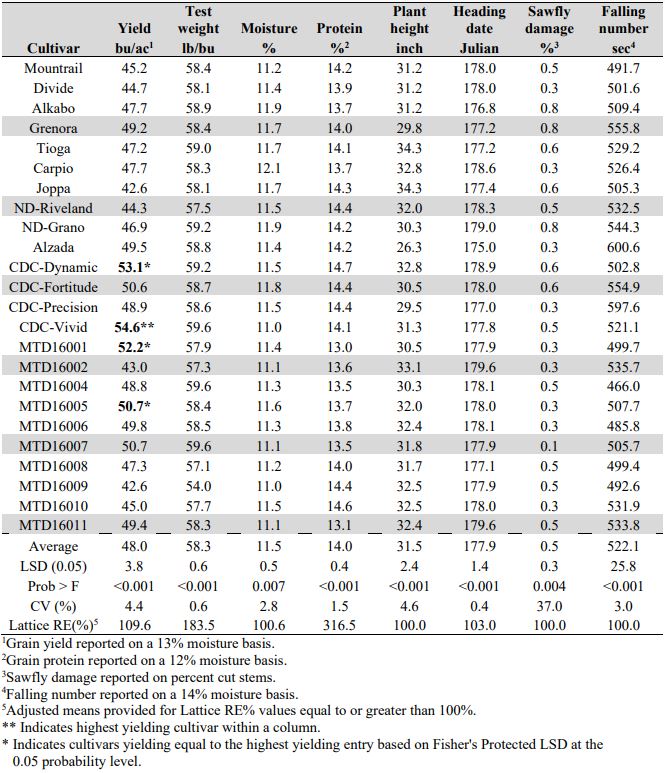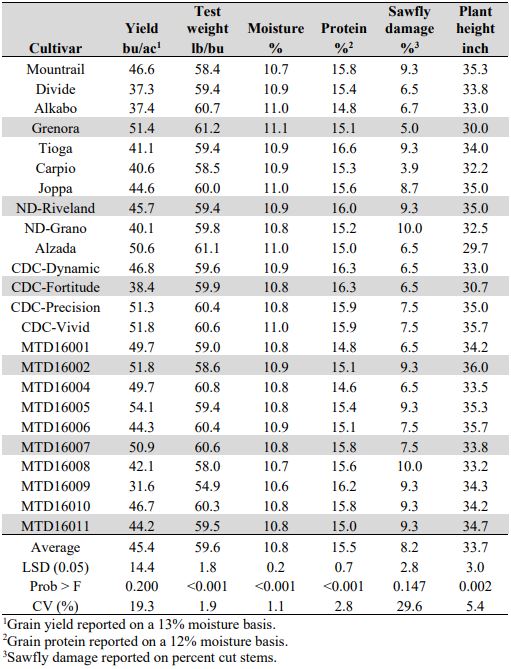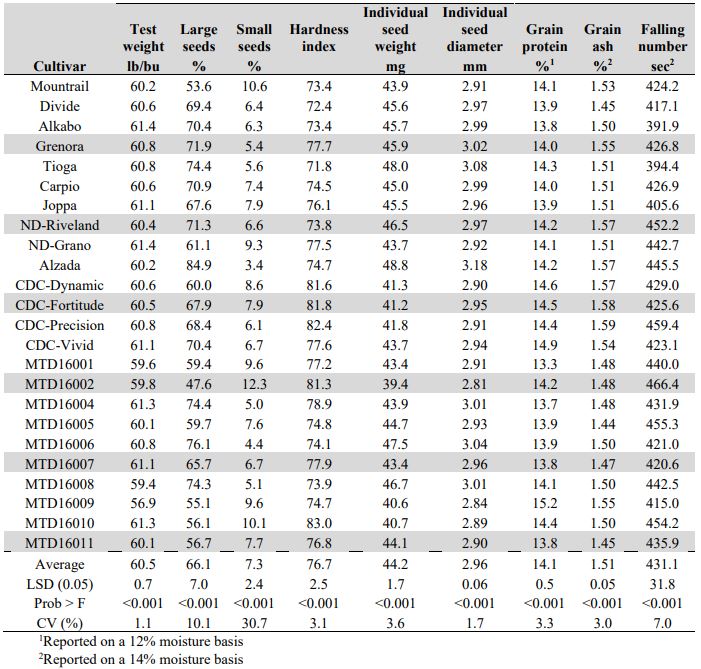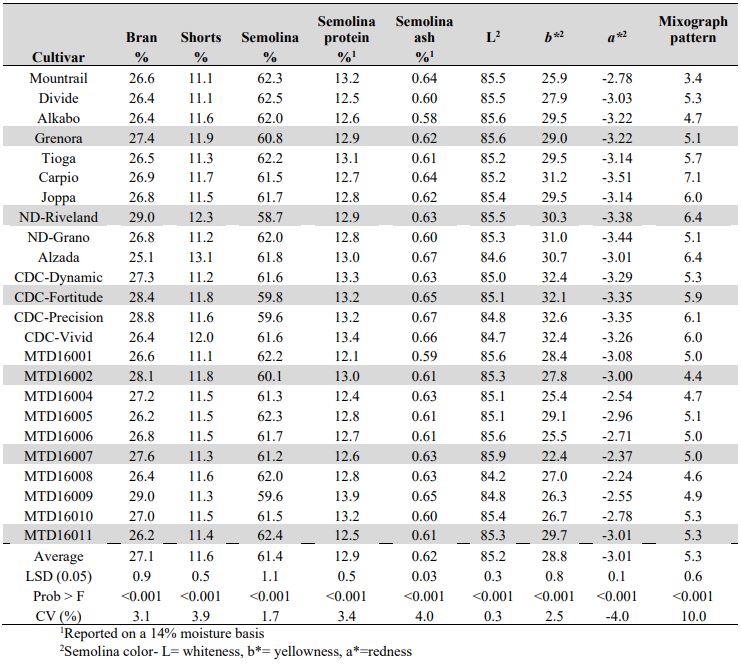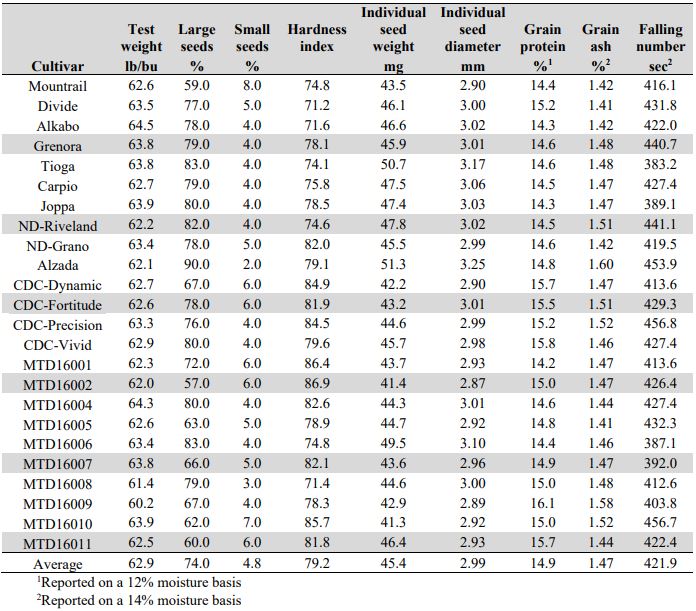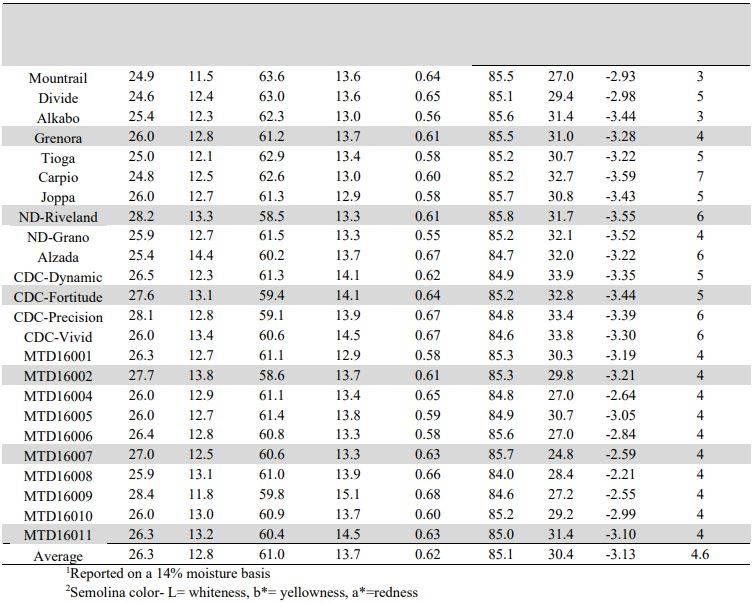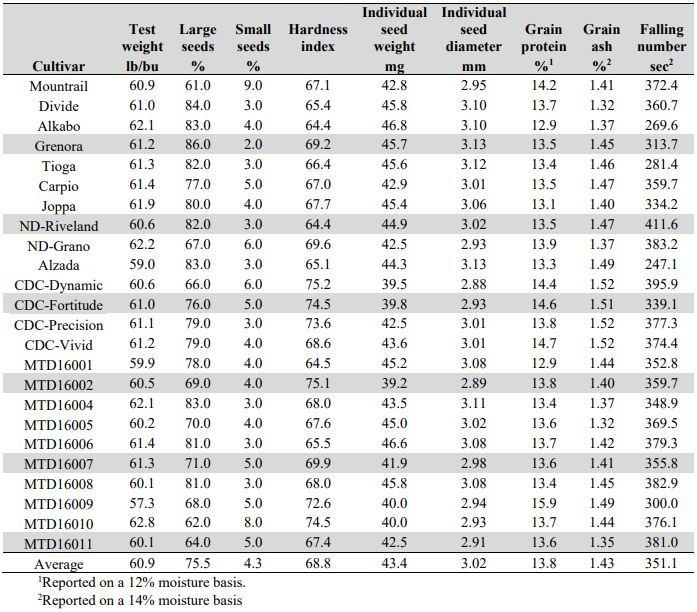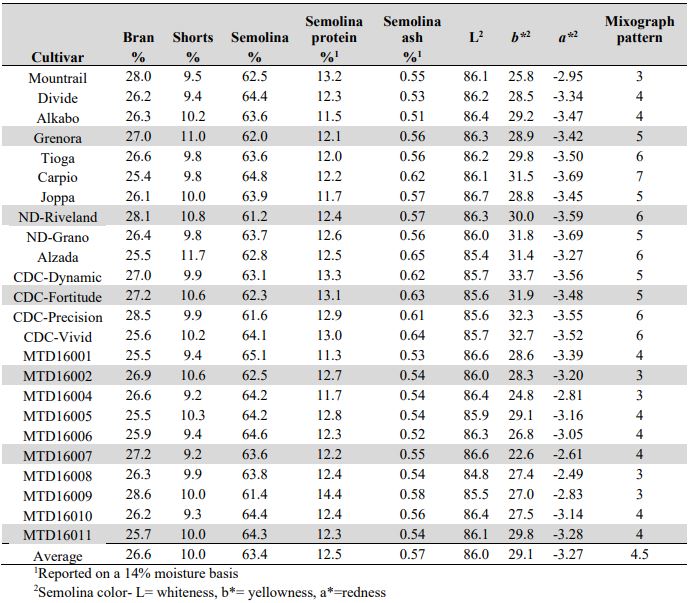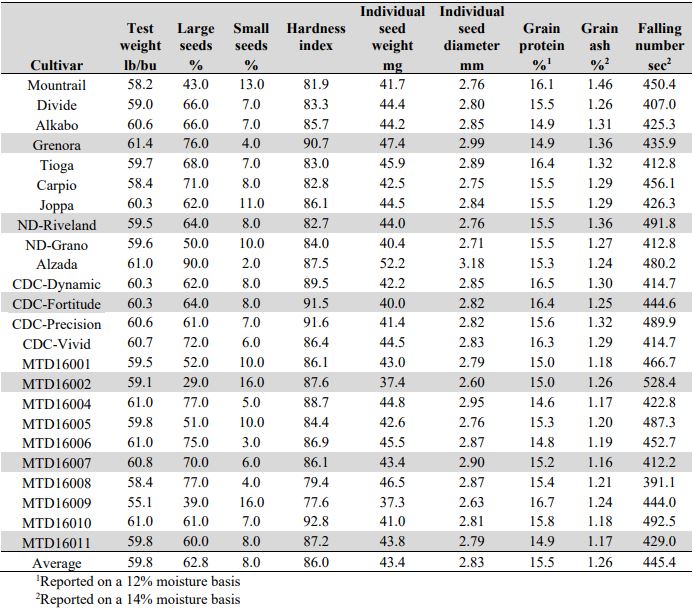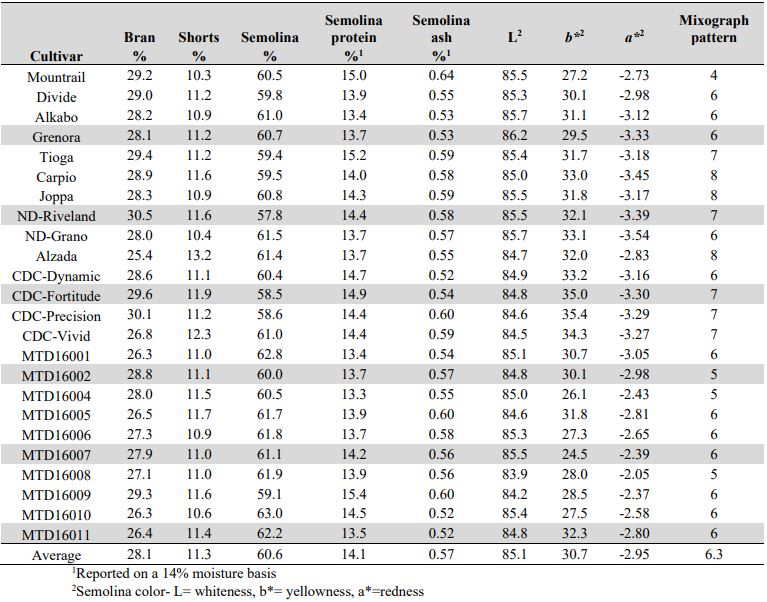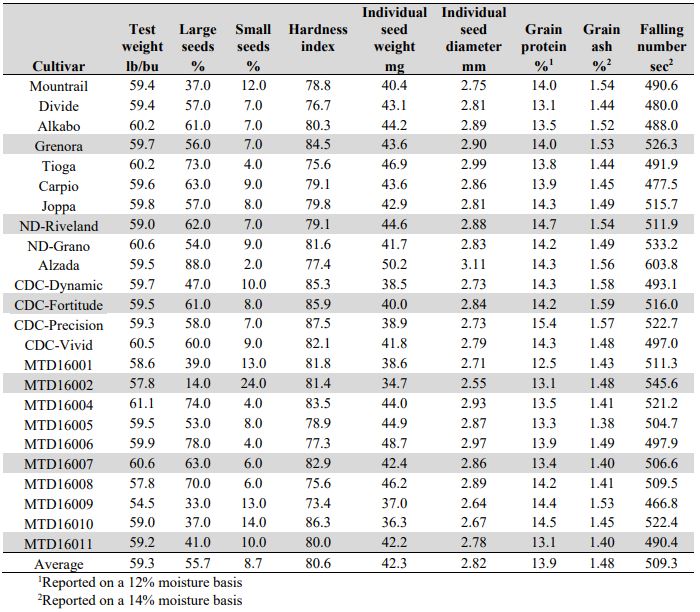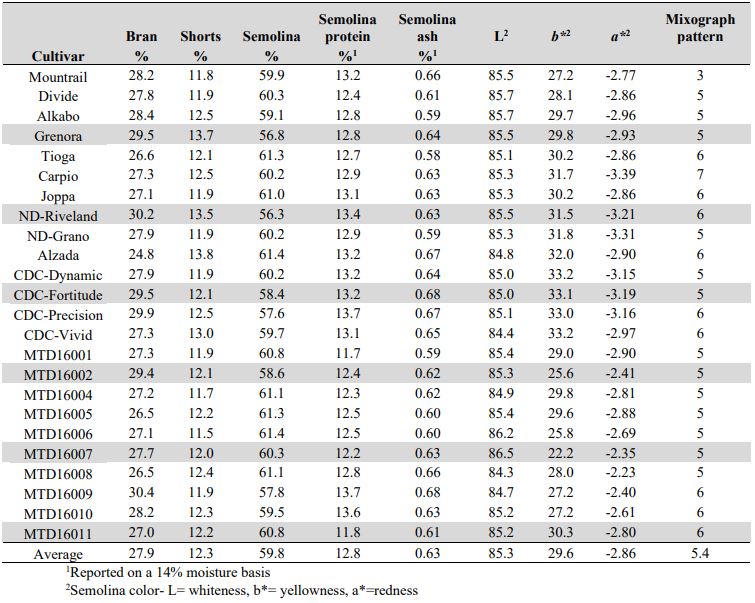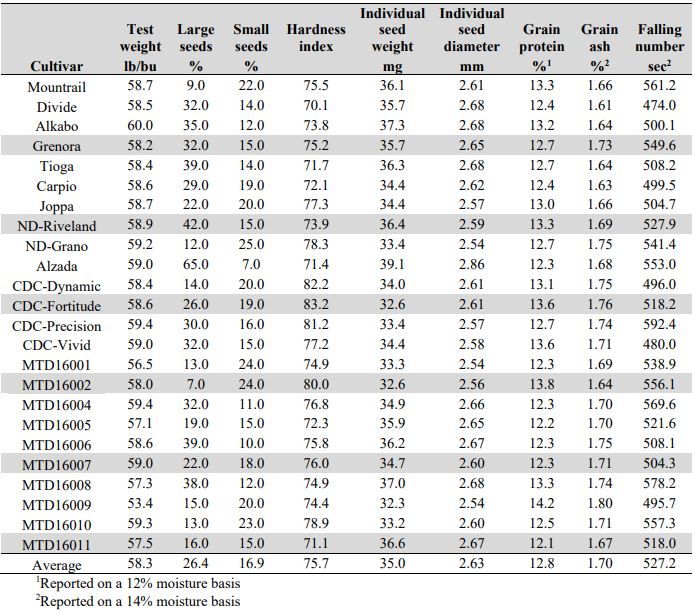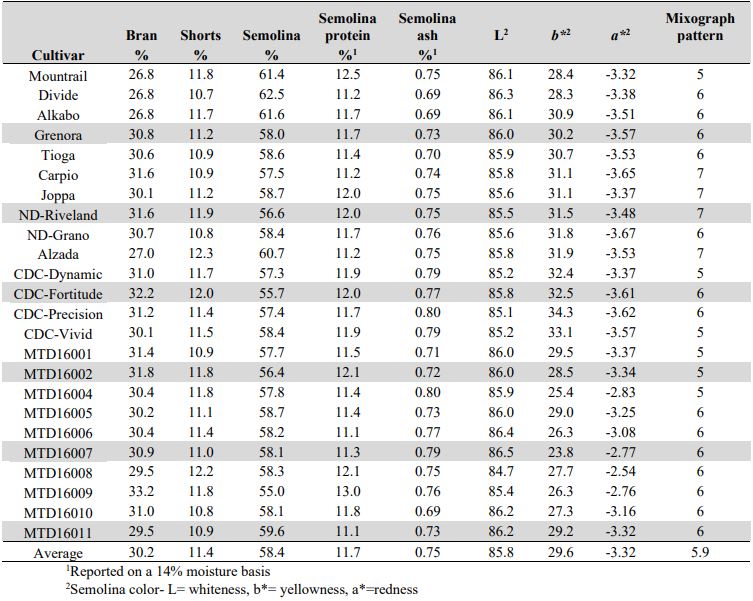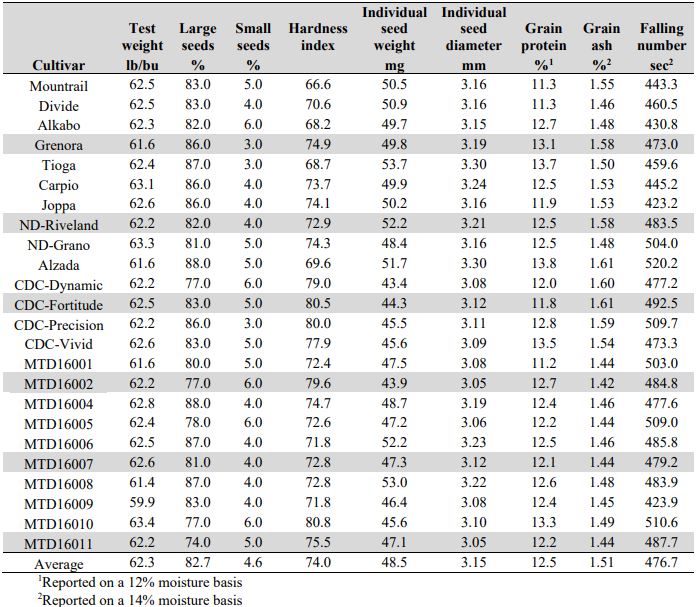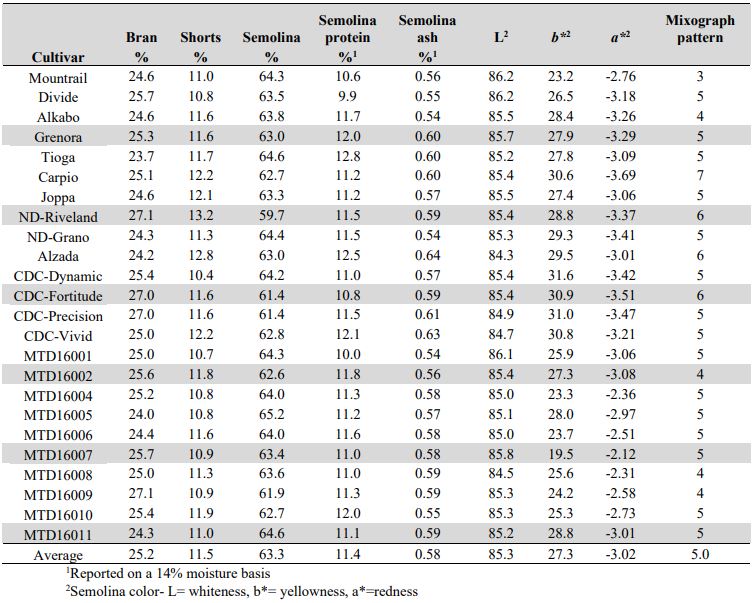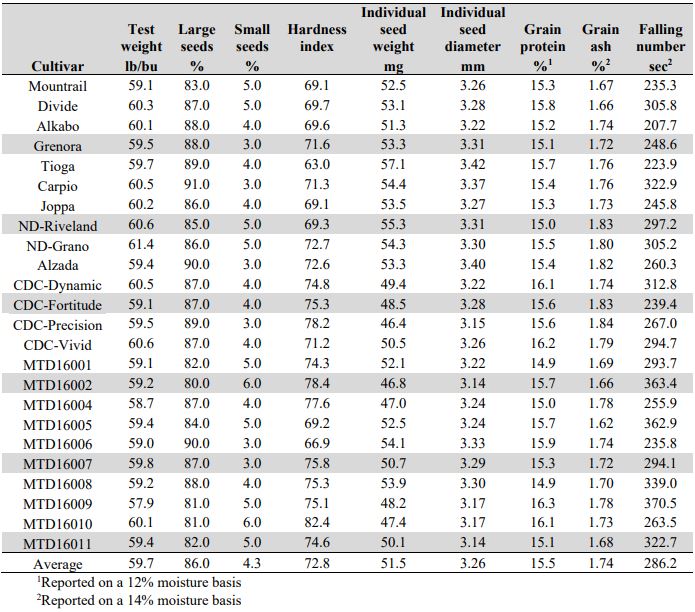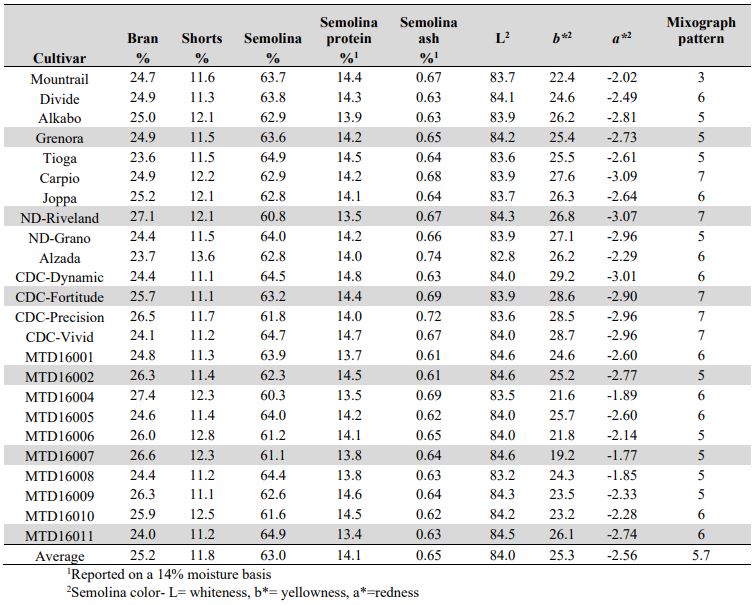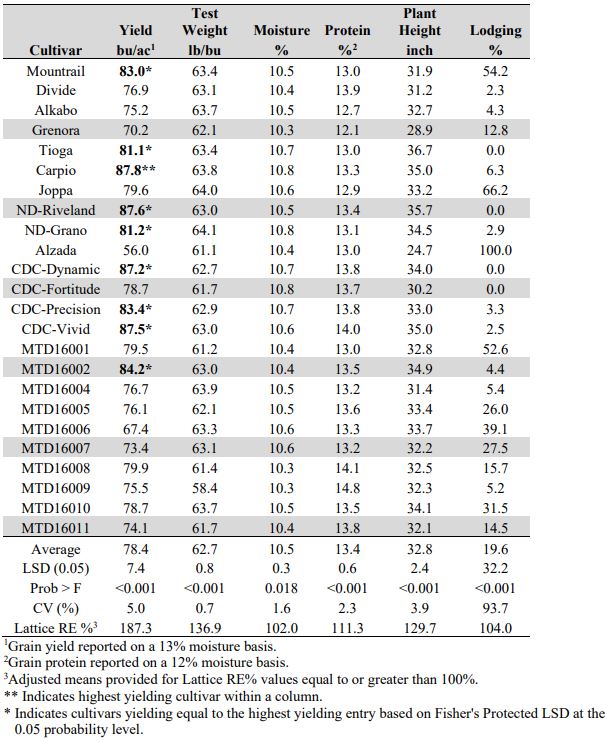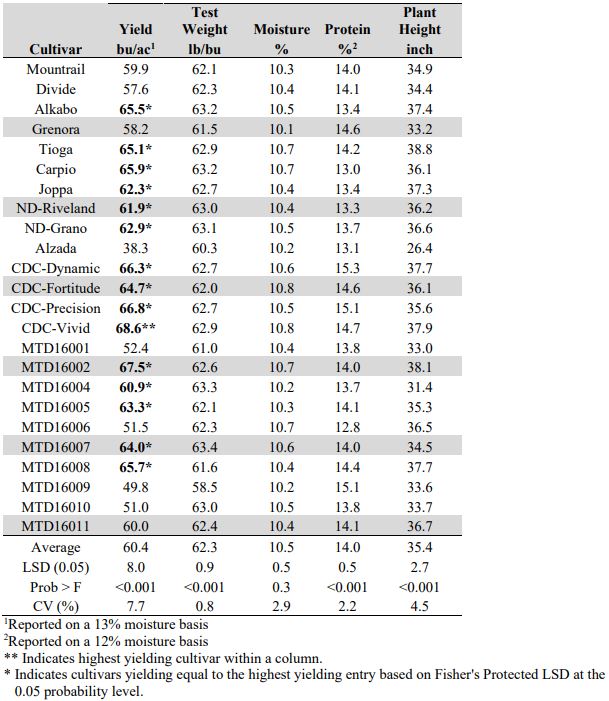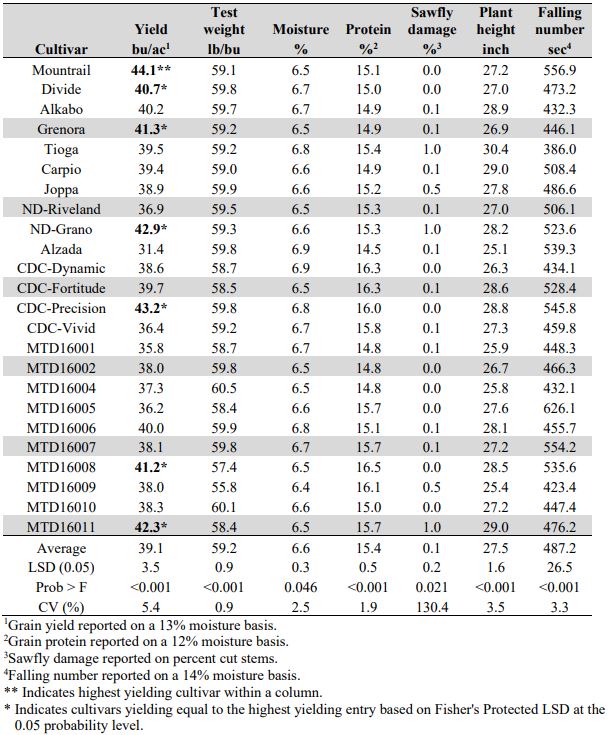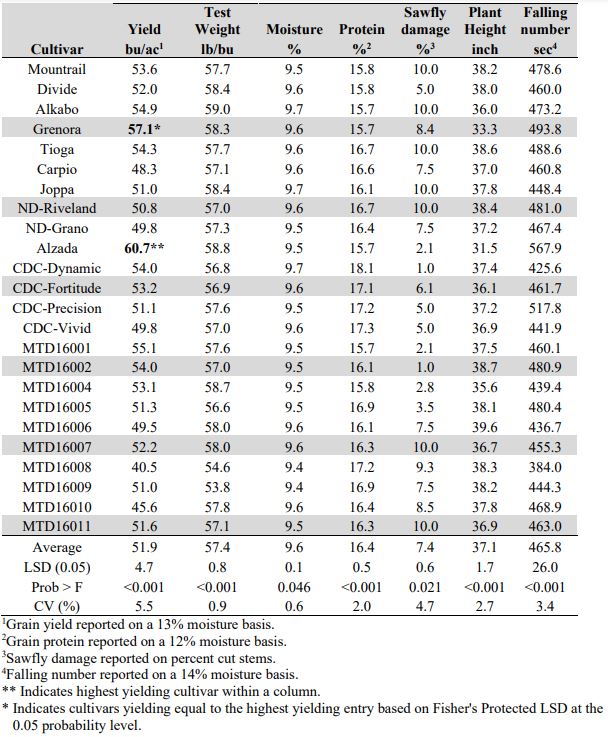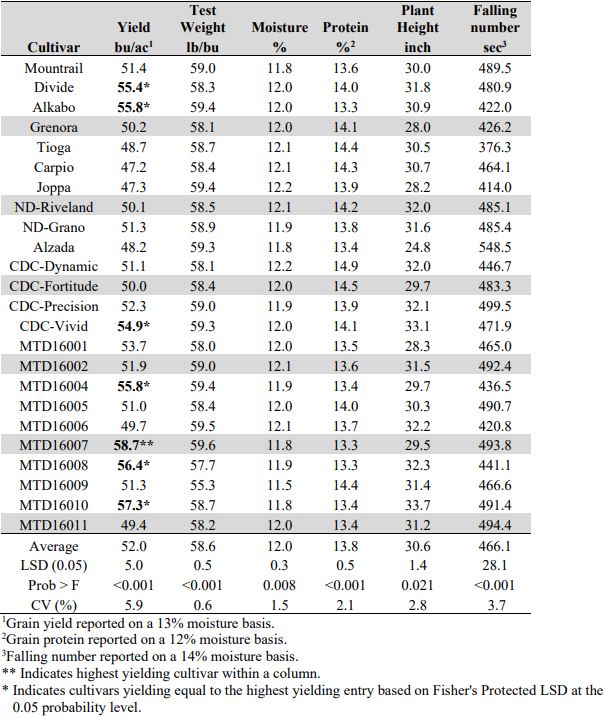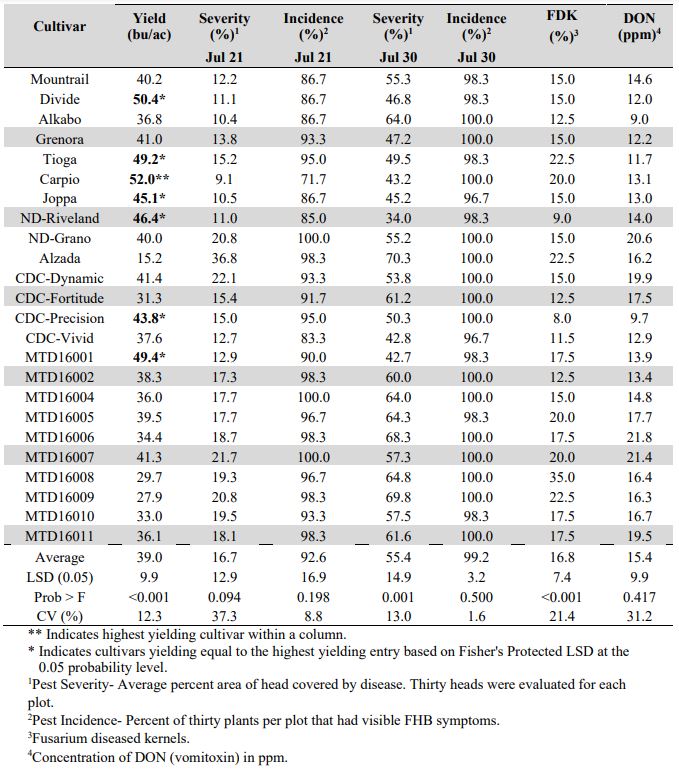2019 Statewide Durum Report
To download a pdf version, click here.
PRINCIPAL INVESTIGATORS:
Dr. Michael Giroux, MSU-Bozeman, MT Email: mgiroux@montana.edu
Phone: (406) 994-7877
Mr. Andy Hogg, MSU-Bozeman, MT Email: ahogg@montana.edu
Phone: (406) 994-1876
CONTRIBUTORS:
Dr. Pat Carr and Dr. Jed Eberly, MSU-CARC, Moccasin, MT
Dr. Chengci Chen, Dr. Frankie Crutcher, Ms. Calla Kowatch, Ms. Amber Ferda, and Ms. Samantha Hoesel, MSU-EARC, Sidney, MT
Ms. Peggy Lamb and Ms. Kyla McNamara, MSU-NARC, Havre, MT
Dr. Ken Kephart and Ms. Valerie Smith, MSU-SARC, Huntley, MT
Ms. Julie Orcutt and Ms. Julie Prewett, MSU-WTARC, Conrad, MT
Dr. Linda Dykes, USDA-ARS, Fargo, ND
OBJECTIVE:
To test advanced experimental durum lines for agronomic and quality traits relative
to currently grown cultivars under Montana growing conditions.
METHODS:
In 2019, ten experimental durum lines developed at MSU and fourteen elite durum varieties
were tested at six Montana Agricultural Experiment Stations and six off-station locations.
Experimental lines developed at MSU carry genetic markers associated with reduced
cadmium accumulation and/or a licensed gene that increases pasta firmness (Table 1).
Durum varieties tested include releases from North Dakota State University, University
of Saskatchewan-Canadian Crop Development Center, and Westbred (Table 1). Dryland
experiments were grown on-station in Bozeman, MT (MSU-Post Agronomy Farm), Havre,
MT (MSU-NARC), Sidney, MT (MSU-EARC), Conrad, MT (MSU-WTARC), Huntley, MT
(MSU-SARC), and Moccasin, MT (MSU-CARC). Irrigated trials were grown on-station in Bozeman, MT (MSU-Post Agronomy Farm) and Sidney, MT (MSU-EARC). At the Bozeman locations two additional MSU experimental lines, MT112219 and MTD16003, were grown to maintain experimental design. There were three off-station experiments planted in Eastern Montana by EARC staff and three off-station experiments planted in North Central Montana by NARC staff. The trial at SARC this year was destroyed before harvest by hail and the Wibaux off-station site in Eastern Montana was sprayed out by the cooperator. There were three replicates of each line/variety grown at each location in either a randomized complete block design or an alpha-lattice design to determine statistical differences. Seed was treated with CruiserMaxx Vibrance for Cereals® (Syngenta) (5 fl oz/100 lb). MAES research cooperators provided agronomic data such as plant height, heading date, pest pressure, grain protein content, grain test weight, and grain yield. On-station grain sub-samples from the three replicates per line per location were bulked and submitted to Dr. Linda Dykes (USDA-ARS, Fargo, ND) for analysis of seed traits, milling and semolina quality, and mixing strength.
Overall statewide agronomic performance from 2019 can be found in Table 1. Statewide yield and protein evaluation over three years (2017-19) are presented in Table 2. Statewide agronomic performance for 2019 separated by environment (irrigated or dryland) is presented in Tables 3 and 4. Agronomic data for each individual location is found in Tables 5-12 with overall quality data summarized in Tables 13 and 14. Individual location quality data can be found in Tables 15-28. Agronomic data for off-station variety trails grown in the North Central and North Eastern Montana can be found in Tables 29-33.
Results
Table 1. Agronomic means from 2019 intrastate durum trials all locations (n=7) and conditions.
Table 2. Yield and protein evaluation for statewide durum testing 23 location-years.
Table 3. Agronomic means from 2019 irrigated intrastate durum trials (n=2).
Table 4. Agronomic means from 2019 dryland intrastate durum trials (n=5).
Table 5. Agronomic means from 2019 irrigated intrastate durum trial conducted by Giroux/Hogg at the Post Agronomy Farm in Bozeman, MT.
Table 6. Agronomic means from 2019 dryland intrastate durum trial conducted by Giroux/Hogg at the Post Agronomy Farm in Bozeman, MT.
Table 7. Agronomic means from 2019 dryland intrastate durum trial conducted at Southern Agricultural Research Center Huntley, MT. Plots were destroyed by hail on August 11th before harvest.
Table 8. Agronomic means from 2019 irrigated intrastate durum trial conducted at Eastern Agricultural Research Center Sidney, MT.
Table 9. Agronomic means from 2019 dryland intrastate durum trial conducted at Eastern Agricultural Research Center Sidney, MT.
Table 10. Agronomic means from 2019 dryland intrastate durum trial at Central Agricultural Research Center in Moccasin, MT.
Table 11. Agronomic means from 2019 dryland intrastate durum trial at Northern Agricultural Research Center in Havre, MT.
Table 12. Agronomic means from 2019 dryland intrastate durum trial at Western Triangle Agricultural Research Center in Conrad, MT.
Table 13. USDA-ARS seed quality means from all locations (n=7) for 2019 intrastate durum trial.
Table 14. USDA-ARS semolina quality means from all locations (n=7) for 2019 intrastate durum trial.
Table 15. USDA-ARS seed quality means for Bozeman dryland for 2019 intrastate durum trial.
Table 16. USDA-ARS semolina quality means from Bozeman dryland for 2019 intrastate durum trial.
Table 17. USDA-ARS seed quality means for Bozeman irrigated for 2019 intrastate durum trial.
Table 18. USDA-ARS semolina quality means from Bozeman irrigated for 2019 intrastate durum trial.
Table 19. USDA-ARS seed quality means from WTARC for 2019 intrastate durum trial.
Table 20. USDA-ARS semolina quality means from WTARC for 2019 intrastate durum trial.
Table 21. USDA-ARS seed quality means from NARC for 2019 intrastate durum trial.
Table 22. USDA-ARS semolina quality means from NARC for 2019 intrastate durum trial.
Table 23. USDA-ARS seed quality means from CARC for 2019 intrastate durum trial.
Table 24. USDA-ARS semolina quality means from CARC for 2019 intrastate durum trial.
Table 25. USDA-ARS seed quality means from EARC dryland for 2019 intrastate durum trial.
Table 26. USDA-ARS semolina quality means from EARC dryland for 2019 intrastate durum trial.
Table 27. USDA-ARS seed quality means from EARC irrigated for 2019 intrastate durum trial.
Table 28. USDA-ARS semolina quality means from EARC irrigated for 2019 intrastate durum trial.
Table 29. Agronomic means from 2019 dryland off-station durum trial Roosevelt Co., MT.
Table 30. Agronomic means from 2019 dryland off-station durum trial Sheridan, MT.
Table 31. Agronomic means from 2019 dryland off-station durum trial Turner, MT.
Table 32. Agronomic means from 2019 dryland off-station durum trial Chester, MT.
Table 33. Agronomic means from 2019 dryland off-station durum trial Loring, MT.
Table 34: Fusarium head blight evaluation 2019 (Dr. Frankie Crutcher, EARC).

